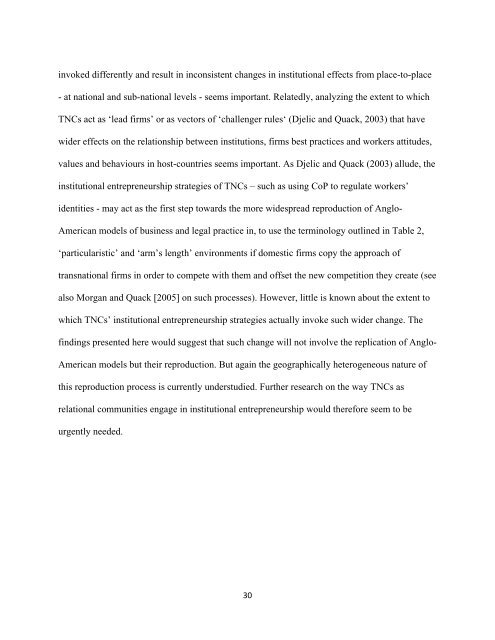Learning to be a lawyer in transnational law firms: communities of ...
Learning to be a lawyer in transnational law firms: communities of ...
Learning to be a lawyer in transnational law firms: communities of ...
Create successful ePaper yourself
Turn your PDF publications into a flip-book with our unique Google optimized e-Paper software.
<strong>in</strong>voked differently and result <strong>in</strong> <strong>in</strong>consistent changes <strong>in</strong> <strong>in</strong>stitutional effects from place-<strong>to</strong>-place<br />
- at national and sub-national levels - seems important. Relatedly, analyz<strong>in</strong>g the extent <strong>to</strong> which<br />
TNCs act as ‘lead <strong>firms</strong>’ or as vec<strong>to</strong>rs <strong>of</strong> ‘challenger rules‘ (Djelic and Quack, 2003) that have<br />
wider effects on the relationship <strong>be</strong>tween <strong>in</strong>stitutions, <strong>firms</strong> <strong>be</strong>st practices and workers attitudes,<br />
values and <strong>be</strong>haviours <strong>in</strong> host-countries seems important. As Djelic and Quack (2003) allude, the<br />
<strong>in</strong>stitutional entrepreneurship strategies <strong>of</strong> TNCs – such as us<strong>in</strong>g CoP <strong>to</strong> regulate workers’<br />
identities - may act as the first step <strong>to</strong>wards the more widespread reproduction <strong>of</strong> Anglo-<br />
American models <strong>of</strong> bus<strong>in</strong>ess and legal practice <strong>in</strong>, <strong>to</strong> use the term<strong>in</strong>ology outl<strong>in</strong>ed <strong>in</strong> Table 2,<br />
‘particularistic’ and ‘arm’s length’ environments if domestic <strong>firms</strong> copy the approach <strong>of</strong><br />
<strong>transnational</strong> <strong>firms</strong> <strong>in</strong> order <strong>to</strong> compete with them and <strong>of</strong>fset the new competition they create (see<br />
also Morgan and Quack [2005] on such processes). However, little is known about the extent <strong>to</strong><br />
which TNCs’ <strong>in</strong>stitutional entrepreneurship strategies actually <strong>in</strong>voke such wider change. The<br />
f<strong>in</strong>d<strong>in</strong>gs presented here would suggest that such change will not <strong>in</strong>volve the replication <strong>of</strong> Anglo-<br />
American models but their reproduction. But aga<strong>in</strong> the geographically heterogeneous nature <strong>of</strong><br />
this reproduction process is currently understudied. Further research on the way TNCs as<br />
relational <strong>communities</strong> engage <strong>in</strong> <strong>in</strong>stitutional entrepreneurship would therefore seem <strong>to</strong> <strong>be</strong><br />
urgently needed.<br />
30
















